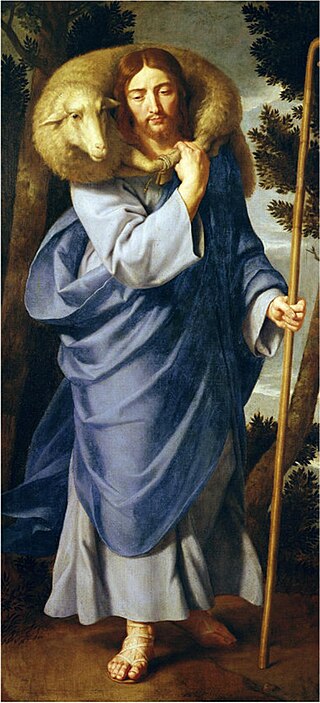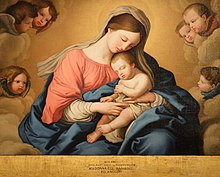
A Christmas carol is a carol on the theme of Christmas, traditionally sung at Christmas itself or during the surrounding Christmas holiday season. The term noel has sometimes been used, especially for carols of French origin. Christmas carols may be regarded as a subset of the broader category of Christmas music.
A doxology is a short hymn of praises to God in various forms of Christian worship, often added to the end of canticles, psalms, and hymns. The tradition derives from a similar practice in the Jewish synagogue, where some version of the Kaddish serves to terminate each section of the service.

"Gloria in excelsis Deo" is a Christian hymn known also as the Greater Doxology and the Angelic Hymn/Hymn of the Angels. The name is often abbreviated to Gloria in Excelsis or simply Gloria.
"Ding Dong Merrily on High" is a Christmas carol. The tune first appeared as a secular dance tune known under the title "Branle de l'Official" in Orchésographie, a dance book written by the French cleric, composer and writer Thoinot Arbeau, pen name of Jehan Tabourot (1519–1593). The words are by the English composer George Ratcliffe Woodward (1848–1934), and the carol was first published in 1924 in his The Cambridge Carol-Book: Being Fifty-two Songs for Christmas, Easter, And Other Seasons. Woodward took an interest in church bell ringing, which no doubt aided him in writing it. Woodward was the author of several carol books, including Songs of Syon and The Cowley Carol Book. The macaronic style is characteristic of Woodward's delight in archaic poetry. Charles Wood harmonised the tune when it was published with Woodward's text in The Cambridge Carol Book. More recently, Sir David Willcocks made an arrangement for the second book of Carols for Choirs.
The "Huron Carol" is a Canadian Christmas hymn, written probably in 1642 by Jean de Brébeuf, a Jesuit missionary at Sainte-Marie among the Hurons in Canada. Brébeuf wrote the lyrics in the native language of the Huron/Wendat people; the song's original Huron title is "Jesous Ahatonhia". The song's melody is based on a traditional French folk song, "Une Jeune Pucelle". The well-known English lyrics were written in 1926 by Jesse Edgar Middleton and the copyright to these lyrics was held by The Frederick Harris Music Co., Limited, but entered the public domain in 2011.
"Ar Hyd y Nos" is a Welsh song sung to a tune that was first recorded in Edward Jones' Musical and Poetical Relics of the Welsh Bards (1784). The most commonly sung Welsh lyrics were written by John Ceiriog Hughes (1832-1887), and have been translated into several languages, including English and Breton. One of the earliest English versions, to different Welsh lyrics by one John Jones, was by Thomas Oliphant in 1862.

A Ceremony of Carols, Op. 28 is an extended choral composition for Christmas by Benjamin Britten scored for three-part treble chorus, solo voices, and harp. The text, structured in eleven movements, is taken from The English Galaxy of Shorter Poems, edited by Gerald Bullett. It is principally in Middle English, with some Latin and Early Modern English. It was composed in 1942 on Britten's sea voyage from the United States to England.
The Divine Service is a title given to the Eucharistic liturgy as used in the various Lutheran churches. It has its roots in the Pre-Tridentine Mass as revised by Martin Luther in his Formula missae of 1523 and his Deutsche Messe of 1526. It was further developed through the Kirchenordnungen of the sixteenth and seventeenth centuries that followed in Luther's tradition.

"O come, O come, Emmanuel" is a Christian hymn for Advent, which is also often published in books of Christmas carols. The text was originally written in Latin. It is a metrical paraphrase of the O Antiphons, a series of plainchant antiphons attached to the Magnificat at Vespers over the final days before Christmas. The hymn has its origins over 1,200 years ago in monastic life in the 8th or 9th century. Seven days before Christmas Eve monasteries would sing the “O antiphons” in anticipation of Christmas Eve when the eighth antiphon, “O Virgo virginum” would be sung before and after Mary's canticle, the Magnificat. The Latin metrical form of the hymn was composed as early as the 12th century.
"Glory to God" is a Christmas carol popular among American and Canadian Reformed churches that have Dutch roots. It is translated from the Dutch "Ere Zij God" and is one of the most beloved carols sung in Protestant churches in the Netherlands.

"In dulci jubilo" is a traditional Christmas carol. In its original setting, the carol is a macaronic text of German and Latin dating from the Middle Ages. Subsequent translations into English, such as J. M. Neale's arrangement "Good Christian Men, Rejoice" have increased its popularity, and Robert Pearsall's 1837 macaronic translation is a mainstay of the Christmas Nine Lessons and Carols repertoire. J. S. Bach's chorale prelude based on the tune is also a traditional postlude for Christmas services.

"Wachet auf, ruft uns die Stimme" is a Lutheran hymn written in German by Philipp Nicolai, first published in 1599 together with "Wie schön leuchtet der Morgenstern". It appears in German hymnals and in several English hymnals in translations such as "Wake, Awake, for Night Is Flying", "Wake, O wake! with tidings thrilling", and "Up! Awake! From Highest Steeple". Johann Sebastian Bach based a chorale cantata on the hymn, Wachet auf, ruft uns die Stimme, BWV 140, one of its many musical settings.

"Angels from the Realms of Glory" is a Christmas carol written by Scottish poet and hymnwriter James Montgomery. It was first printed in the Sheffield Iris on Christmas Eve 1816, though it only began to be sung in churches after its 1825 reprinting in the Montgomery collection The Christian Psalmist and in the Religious Tract Society's The Christmas Box or New Year's Gift.
James Chadwick was an Anglo-Irish Roman Catholic priest, and second Bishop of Hexham and Newcastle. He is famous for writing the lyrics of the song Angels We Have Heard on High.

Der Herr ist mein getreuer Hirt, BWV 112, is a cantata by Johann Sebastian Bach, a church cantata for the second Sunday after Easter. Bach composed the chorale cantata in Leipzig and first performed it on 8 April 1731. It is based on the hymn by Wolfgang Meuslin, a paraphrase of Psalm 23 written in 1530, sung to a melody by Nikolaus Decius.

Angels' Carol is a popular sacred choral piece by John Rutter for Christmas. He wrote his own text, beginning "Have you heard the sound of the angel voices", three stanzas with the refrain "Gloria in excelsis Deo". It has been part of recordings of collections of Christmas music, including one conducted by the composer.

"All Glory, Laud and Honour" is an English translation by the Anglican clergyman John Mason Neale of the Latin hymn "Gloria, laus et honor", which was written by Theodulf of Orléans in 820. It is a Palm Sunday hymn, based on Matthew 21:1–11 and the occasion of Christ's triumphal entry into Jerusalem.

"Vom Himmel hoch, da komm ich her" is a hymn text relating to the Nativity of Jesus, written by Martin Luther in 1534. The hymn is most often sung to the melody, Zahn No. 346, which first appeared in a 1539 songbook and was probably also composed by Luther. This classic Christmas carol remains popular and has inspired many choral and organ works by other composers.

"Allein Gott in der Höh sei Ehr" is an early Lutheran hymn, with text and melody attributed to Nikolaus Decius. With the reformers intending church service in German, it was intended as a German version of the Gloria part of the Latin mass, used in almost every service. Decius wrote three stanzas, probably in 1523, while a fourth was added, probably by Joachim Slüter.













